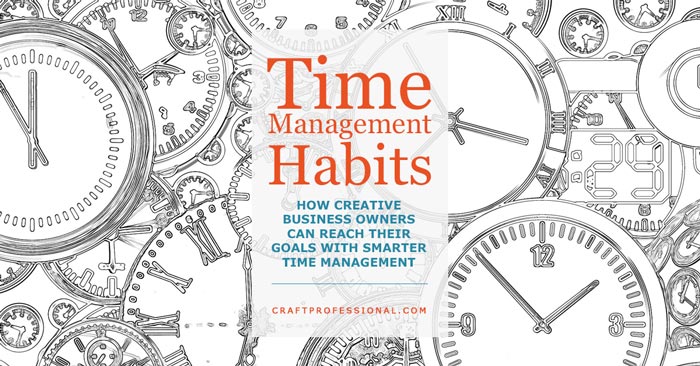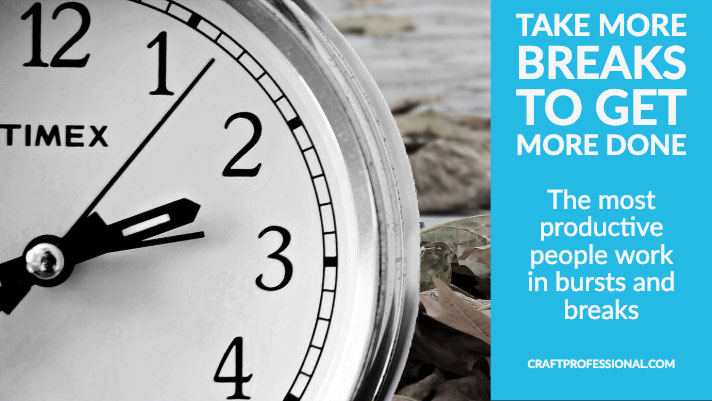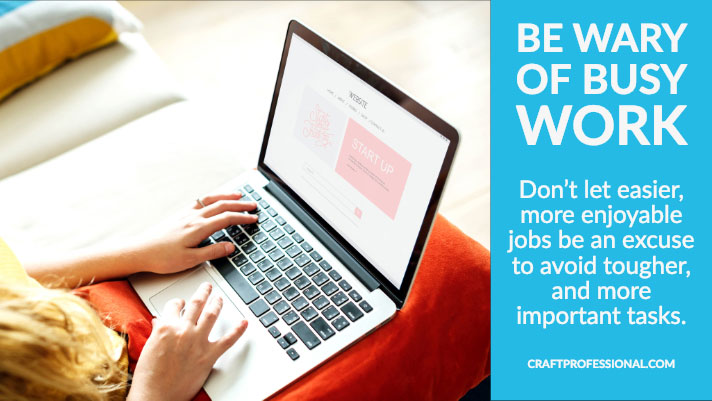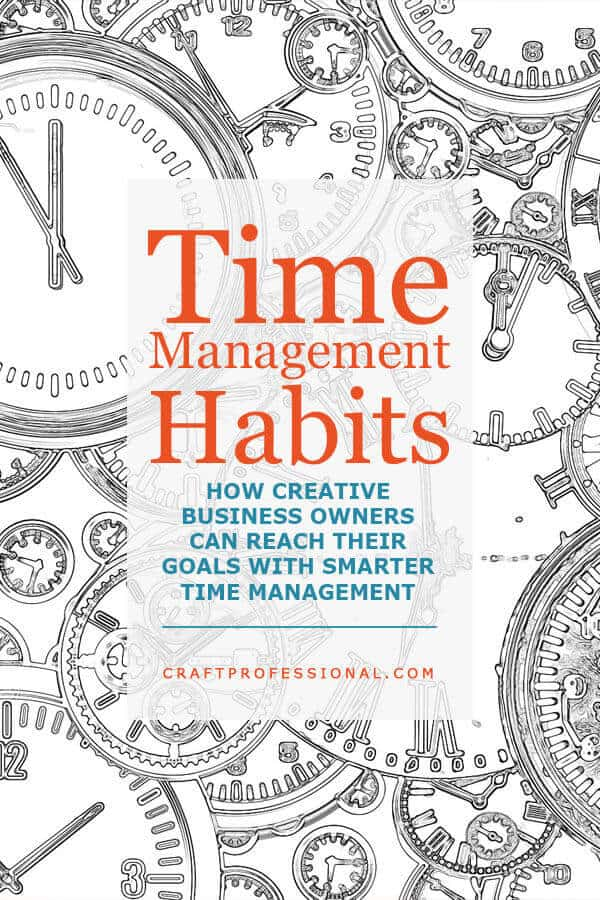Better Time Management Habits
Accomplish more with better time management habits. Here's how creative business owners can reach their goals with smarter time management.
Normally I'm not a big fan of advice about time management habits.
Of course, I'd love to work more efficiently, and I've read loads of books and articles on the subject. Unfortunately, most of the tips I've read are pretty unhelpful, and sometimes they're downright annoying.

I eagerly read the latest and greatest from time management gurus, hoping to find a way to accomplish more. But I almost always end up frustrated by their advice.
If I had a life that allowed me to actually implement their strategies, I wouldn't need to read their advice in the first place.
Most time management tips are great for people who are fully in control of their time. A lot of the advice I've read isn't particularly helpful for people like me who work from home and constantly deal with demands on their time that they can't control.
I earn a commission for purchases made through links on this page.
To learn more, please see my disclosure.
That's why I was thrilled to read Tony Crabbe's advice on developing better time management habits.
Tony Crabbe is a business psychologist, and in my books, he's the real deal. He throws away the frustrating idea of trying to cram your days with more tasks that most time management gurus advocate. Instead, he encourages people to accomplish more by doing less.
In his book, Busy, he shares useful tidbits many of us can actually implement even if we aren't fully in control of our time. Here are five of my favorite, actually useful tips to help you work more effectively.
1. Time your work strategically

I'm fortunate to have a good block of about six hours of uninterrupted work time on most week days. I know many craft professionals don't have that luxury, and I've only had it in the last few years since both of my kids have been in school full time.
I get my best work done in these luxurious, uninterrupted hours.
It's tempting to try to buckle down and just flat-out work without stopping to get the most out of those six hours every day. Research shows working like that would be a big mistake.
If you do have nice, big chunks of work time in your days, it's best to think of those times as a series of intense bursts instead of one, long, unending work session. Tony Crabbe explains that you can't be alert 100% of the time for hours at a time.
In fact, research by The Draugiem Group, developers of the time tracking app, Desk Time, shows the most productive people work in bursts with breaks in between. The ideal timing is about 52 minutes of work followed by 17 minutes away from your work.
You don't have to time your breaks that precisely, but it is wise to take a quick break every hour if you can.
It's tempting to just keep working, especially if your time is limited. If you're like me, you probably feel that you don't want to waste a single minute of your precious work time. However, you might want to try giving yourself a little break once every hour and see if it improves your overall output and creativity.
If hourly breaks can help you to work with more creativity and focus, that time you take away from your work, might actually give you back even more time in the form of better focus.
I have an alarm set to buzz once every hour while I'm working. It reminds me to take a little break.
Normally, I just get up and walk around the house. I might make a snack or a cup of tea. I initially started this habit because I'd read that sitting all day was unhealthy, even if you exercise regularly, and my work definitely causes me to sit in front of my computer a lot.
I was pleased to learn that those small breaks I've been taking for my health are also good for my ability to work and think more effectively.
2. focus on your habits, not your willpower

Some people appear to have spectacular willpower. They get loads of work done in a day, and they stay consistent with their commitments even when it's tough.
It turns out, those people have great habits, not spectacular willpower. Our willpower is finite. Even the most committed, hard-working people only have so much of it.
If we focus instead on developing good habits - those things you do without even thinking about it - we can accomplish more.
Habits don't drain your willpower as much because you don't need to make a conscious decision to get started; they are automatic. Tony Crabbe says, "Those with strong willpower have more self-control because of the strength and effectiveness of their habits."
Instead of trying to white-knuckle it through piles of work, try to develop time management habits that help you get more done, and be wary of habits that get in the way of your work.
If, for example, you have trouble getting started on the big jobs each day, cultivate a habit that helps you get started.
It's easier to move on to the next step in a project when you're in the middle of working on it. Getting started can be much harder.
Try developing the habit of writing a note to yourself about the next step you need to do on your project before you finish work at the end of the day. Make this note while you're still in the flow of work. That habit should make it easier for you to jump in and get started the next day.
You'll appear to have spectacular willpower, but what you'll really have is a helpful time management habit that supports your work.
3. Be wary of work avoidance

Most of us have tasks that make us feel like we're working, but, in fact, they allow us to avoid the most important (usually more challenging) work that we really need to do to push our goals forward.
For me, taking care of social media (especially Pinterest - I do love to get lost on Pinterest) and also reading the blogs I follow to stay up to date in my niche are my work avoidance tasks.
Those tasks are necessary jobs and important to my business. However, they are also easy and enjoyable jobs that I catch myself doing when I'm supposed to be working on tougher tasks.
When I'm not feeling inspired to do the more challenging work, it's so easy for me to default to pinning or reading the blogs I follow. I still feel like I'm working, but if I let those easy tasks take over too often, I'll never complete the more challenging and substantial projects that are essential to reaching my goals.
Do you have tasks that are technically work, but are also convenient excuses to avoid your tougher jobs?
Be very wary about how much time you spend on those easy jobs. Don't let them become sneaky excuses for avoiding your real work.
4. Be smart about your easy work
You may resolve to stop using simple tasks to avoid tougher work, but you'll still need to find time to complete those simpler, but necessary tasks.
Choose a time to push through emails, social media, and any other tasks that are important, but not particularly taxing on your brain.
Limit the time you spend on these tasks by setting a timer. Being aware of time can help you push through easy jobs faster.
Also, do this work during your less productive hours, not when you're at your freshest and best. Save you best work hours for your most impactful and challenging tasks.
5. Monitor your progress

Have you heard the adage, what gets measured gets managed?
It's true.

We're better able to control our behavior when we monitor it. So, it's smart to find a way to monitor your progress to ensure you're really completing the work you've committed to doing.
I use a simple planner to monitor my progress. I track daily habits with it, and I also set goals for the work I want to get done weekly and monthly.
Tracking my work has helped me to be far more consistent and get more done.
When you don't monitor your progress, it's easy to put things off for longer than you realize. Before you know it, weeks or months have passed, and you're no closer to your goal.
I used to average writing about two articles per month for this site - much less than I'd like to write. When I started using a planner to monitor my writing progress, I was able to triple the articles I write for this site each month.
Now I'm averaging about 6 new articles per month. The amount of time I have available for work hasn't changed, but monitoring my progress makes me see when I'm falling behind and helps me refocus on the task at hand.
Busy
If you want to learn more about making the most of your time - not just cramming more work into your days, but really, mindfully making choices that help you thrive - I highly recommend Tony Crabbe's book, Busy.
I don't often get excited by time management books, but this book is so much more than that and definitely worth the time it takes to read and absorb all of the lessons and strategies.


New! Comments
Have your say about what you just read! Leave me a comment in the box below.